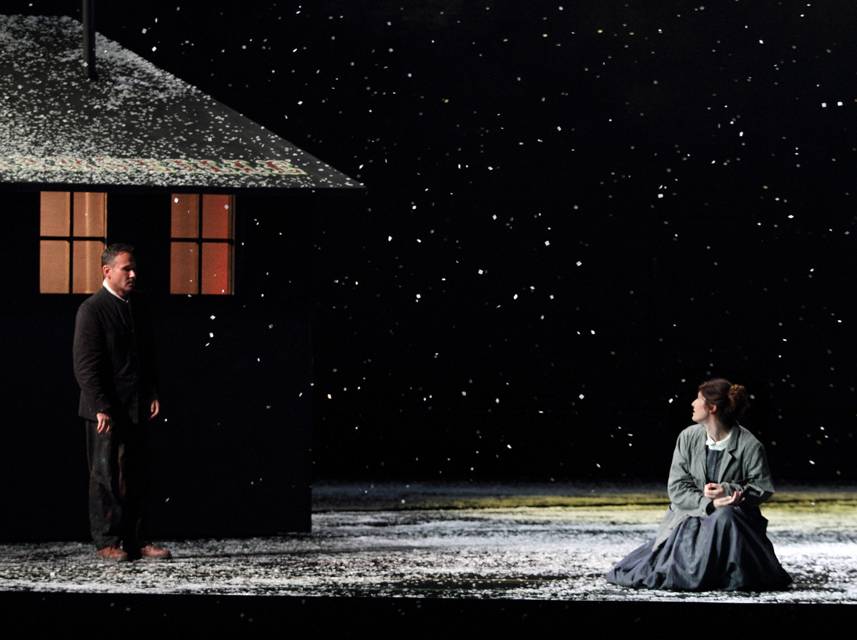There are countless good translations and English-language versions of operas traditionally sung in other European languages and more are being produced every year. If English is your first – in many cases only – language, this makes such pieces much more accessible. So what reasons are there for listening to an opera in its original language?
Translation is a tricky business, especially in opera in which it’s not just a case of preserving the meaning but also the form – rhythm, harmony, rhyme, meter and so on all contribute to the flow of the words. More than any other artform, opera relies on the blend of words and music. Done well, this can produce something that’s utterly sublime – a whole that is truly more than its parts.
The composer will have matched the rhythm, bounce and flow of the melodies to the words of the original language.They will work very closely with the libretto to create a harmony between language and music. With La bohème (The Bohemians, 1896), Puccini and his two librettists Luigi Illica and Giuseppe Giacosa argued via letter for two years over the right dramatic structure for the opera.
A translation must fit the new language into this pre-existing form. The translator of a libretto will often have to play fast and loose with the meaning of the original text to render an equivalent in performable English.
I was lucky enough to see the Royal Opera’s revival of Richard Jones’s production of La bohème. Performed in the original Italian, the discussions between composer and librettists paid off because this marriage between music and words is a happy one.
In his love duet with Mimì, Rodolfo the poet sings of rhyming – he is a poet after all. In the Italian, he rhymes ‘amarezze’ with ‘carezze’, which translate as ‘bitterness’ and ‘caresses’ respectively, which don’t properly rhyme but do have the right rhythm for the music and preserve the meaning. However, the surtitles translated the words as ‘resentment’ and ‘contentment’; these rhyme but the meaning and rhythm have been changed.
Any translation is going to be a compromise between holding onto the meaning and keeping the form. It’s unlikely that a literal translation will fit well to the music, while sticking to the rhythm will almost certainly mangle the meaning.
The simplest answer to this dilemma is to listen to the piece in its original language – that is what the composer intended after all. The words and music ‘belong’ to each other and changing the former risks losing its poetry. Opera is an emotionally cathartic experience which relies – at least in part – on that relationship between language and music; breaking that link could well lose that cathartic experience.
But understanding what’s going on is equally important. This is where the show programme, CD booklet or even internet search come in. Here you can find a full synopsis of the production along with a complete translation of the libretto into English – or any language. This can be read prior to seeing or listening to the opera, so you can understand the action, or afterwards, so you can simply engage with what’s happening on stage.
English surtitles also help – a translation projected above the stage – but of necessity these are cut down to the bare essentials. They give the gist of the action but certainly don’t provide a full description and they don’t preserve the beauty of the original language.
But in these days of surtitles and all the world’s knowledge being available on the internet, it’s arguably not necessary to ever listen to an opera translated into your own language, at least not for reasons of understanding. But you can take purism too far. There is no reason to not translate works into English or any other language, especially if doing so makes opera more accessible to a wider audience. Listening to a piece in your own language creates an immediacy between the performance and the audience that can’t be replicated if the listener is also reading an English translation.
In the end it comes down to what you, as the listener, want to experience, and this may change with every performance. Maybe with a rarely performed opera that you know little about, you want to research it beforehand and hear it first in English; on the other hand you might want to experience something you already know well in its original language. My own preference is generally to see an opera in the language in which the librettist wrote it and then to find out the meaning. For me, this means I can relax into the music and simply enjoy the experience – but I still want to know what’s going on.
Carmen (Bizet, 1875) has to be one of the world’s most widely known operas – even the most novice of opera fans can sing the chorus of the Toreador song. I’ve seen it in several different versions, all of which were thoroughly enjoyable. One, sung in English, updated the action to the modern day, with Carmen as an overworked immigrant and Escamillo as a footballer. The contemporary setting, the use of English and the updated libretto all worked. But a more traditional version sung in the original French worked on its own terms. Both were equally valid.
Ultimately, what’s important is that we have the choice.
Image
The Royal Opera’s traditional take on La bohème sung in the original Italian demonstrates why it is still valid to listen to opera in the language in which the librettist wrote.

